[VIP专享]特殊疑问词+动词不定式结构以及句法功能
特殊疑问词+动词不定式结构以及句法功能
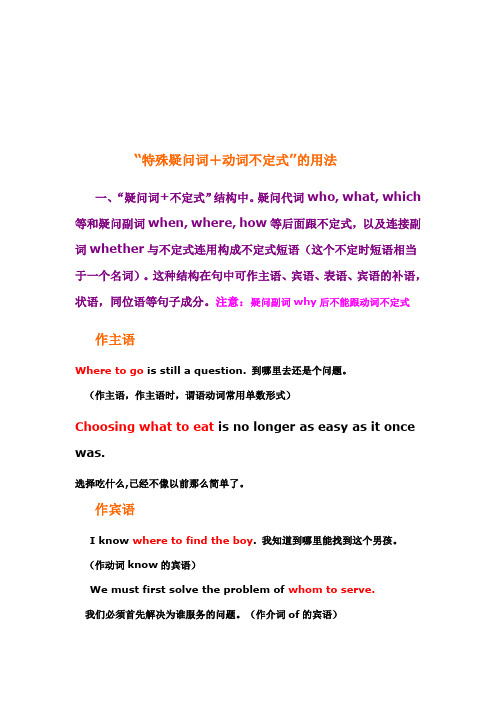
“特殊疑问词+动词不定式”的用法一、“疑问词+不定式”结构中。
疑问代词who, what, which 等和疑问副词when, where, how等后面跟不定式,以及连接副词whether与不定式连用构成不定式短语(这个不定时短语相当于一个名词)。
这种结构在句中可作主语、宾语、表语、宾语的补语,状语,同位语等句子成分。
注意:疑问副词why后不能跟动词不定式作主语Where to go is still a question. 到哪里去还是个问题。
(作主语,作主语时,谓语动词常用单数形式)Choosing what to eat is no longer as easy as it once was.选择吃什么,已经不像以前那么简单了。
作宾语I know where to find the boy. 我知道到哪里能找到这个男孩。
(作动词know的宾语)We must first solve the problem of whom to serve.我们必须首先解决为谁服务的问题。
(作介词of的宾语)作表语The question is how to learn English well.问题是怎样学好英语。
(作表语)作宾语补语I asked her how to learn English.我问她如何学英语。
(用双宾语,宾语补足语)做状语She was at a loss what to do.她不知如何是好。
(做状语)做同位语The question whether to confess troubled the girl.是否要坦白的问题使姑娘很烦恼。
(做同位语)I have no idea which one to take.我不知道拿哪个好。
(同位语)二、“特殊疑问词+动词不定式”结构经常用在某些动词后作宾语,类似的动词有:tell, show, know, learn, teach, find out, forget, wonder, remember等。
特殊疑问词+动词不定式结构

“特殊疑问词+不定式”的用法“疑问词+不定式”结构(question word + to-infinitive)4)疑问代词who, what, which等与疑问副词when, where, how等后面跟不定式,以及连接副词whether 与不定式连用构成不定式短语(在作用上相当于一个名词性从句,名词成分)。
这种结构在句中可作主语、宾语、表语、复合宾语的直接宾语、状语、同位语等句子成分。
注意:疑问副词why后不能跟动词不定式一、“疑问词+不定式动词”结构的几种功用:1)作主语Where to go is still a question、到哪里去还就是个问题。
(作主语时,谓语动词常用单数形式)When to hold the meeting has not yet been decided、Choosing what to eat is no longer as easy as it once was、选择吃什么,已经不像以前那么、、、When to start has not been decided、何时动身尚未决定。
What to read is an important question、该读些什么就是一个很重要的问题。
How to begin is more difficult than where to stop、如何开始比到哪里停止还困难。
2)作宾语(作用相当于名词性从句)A、用作动词宾语He asked how to open the box、她询问如何打开盒子。
She couldn’t think what to say、她想不出说什么。
He could not tell whom to trust、Our teacher explained how to use the word processor、老师向我们说明如何使用文字处理机。
I know where to find the boy、我知道到哪里能找到这个男孩。
“特殊疑问词+动词不定式”的用法归纳
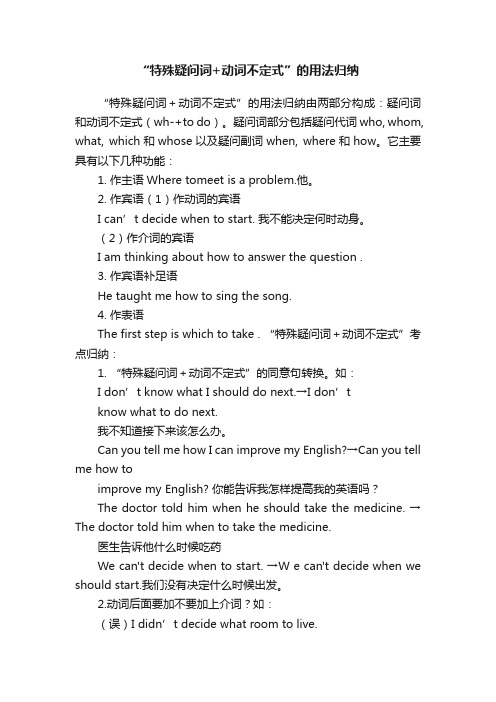
“特殊疑问词+动词不定式”的用法归纳“特殊疑问词+动词不定式”的用法归纳由两部分构成:疑问词和动词不定式(wh-+to do)。
疑问词部分包括疑问代词who, whom, what, which和whose以及疑问副词when, where和how。
它主要具有以下几种功能:1. 作主语Where tomeet is a problem.他。
2. 作宾语(1)作动词的宾语I can’t decide when to start. 我不能决定何时动身。
(2)作介词的宾语I am thinking about how to answer the question .3. 作宾语补足语He taught me how to sing the song.4. 作表语The first step is which to take . “特殊疑问词+动词不定式”考点归纳:1. “特殊疑问词+动词不定式”的同意句转换。
如:I don’t know what I should do next.→I don’tknow what to do next.我不知道接下来该怎么办。
Can you tell me how I can improve my English?→Can you tell me how toimprove my English? 你能告诉我怎样提高我的英语吗?The doctor told him when he should take the medicine. → The doctor told him when to take the medicine.医生告诉他什么时候吃药We can't decide when to start. →W e can't decide when we should start.我们没有决定什么时候出发。
2.动词后面要加不要加上介词?如:(误)I didn’t decide what room to live.(正)I didn’t decide what room to live in. 我没有决定住什么样的房间。
最新“特殊疑问词+动词不定式”的用法归纳

“特殊疑问词+动词不定式”的用法归纳一.由两部分构成:疑问词和动词不定式(wh-+to do)。
疑问词部分包括疑问代词who, whom, what, which和whose以及疑问副词when, where和how。
此外,连接词“whether”也适用.它主要具有以下几种功能:⑴当主语,如:● When to hold the meeting has not yet been decided.● Where to live is a problem.⑵当宾语,常接在forget, find out, discuss, decide, tell, teach, know, learn, wonder, remember等动词之后作宾语如:● We must know what to say at a meeting.● He could not tell whom to trust.● Do you know how to play bridge?⑶当表语,如:● The problem is where to find the financial aid.● The question is who to elect.⑷当名词同位语,如:● Tom had no idea which book to read first.● The question whether to confess troubled the girl.⑸用于宾语补足语,双重宾语。
某些动词后可接“sb.+ 疑问词 + 不定式”构成的双重宾语,这类动词常用的有advise, ask, show, teach, tell等如:● I can tell you where to get this book.● I ask her how to learn English.● He will advise you what to do.● Will you show me how to use the machine?(6) 作介词宾语:某些介词后面可接"疑问词+不定式"作宾语,这类介词常用的有about, as, from, in, of, on, with等。
(完整版)特殊疑问词+动词不定式结构
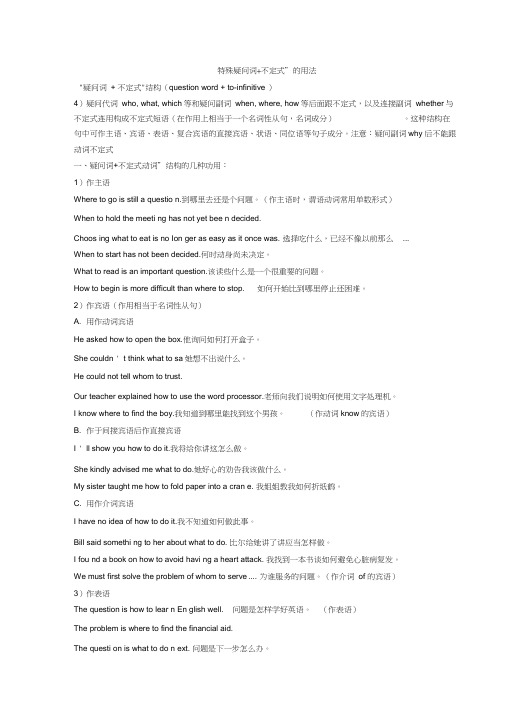
特殊疑问词+不定式”的用法"疑问词+ 不定式"结构(question word + to-infinitive )4)疑问代词who, what, which等和疑问副词when, where, how等后面跟不定式,以及连接副词whether与不定式连用构成不定式短语(在作用上相当于一个名词性从句,名词成分)。
这种结构在句中可作主语、宾语、表语、复合宾语的直接宾语、状语、同位语等句子成分。
注意:疑问副词why 后不能跟动词不定式一、疑问词+不定式动词”结构的几种功用:1)作主语Where to go is still a questio n.到哪里去还是个问题。
(作主语时,谓语动词常用单数形式)When to hold the meeti ng has not yet bee n decided.Choos ing what to eat is no Ion ger as easy as it once was. 选择吃什么,已经不像以前那么...When to start has not been decided.何时动身尚未决定。
What to read is an important question.该读些什么是一个很重要的问题。
How to begin is more difficult than where to stop. 如何开始比到哪里停止还困难。
2)作宾语(作用相当于名词性从句)A. 用作动词宾语He asked how to open the box.他询问如何打开盒子。
She couldn ' t think what to sa她想不出说什么。
He could not tell whom to trust.Our teacher explained how to use the word processor.老师向我们说明如何使用文字处理机。
“特殊疑问词+动词不定式”的用法归纳

“特殊疑问词+动词不定式”的用法归纳一、疑问代词who, what, which等和疑问副词when, where, how等后面跟不定式,构成不定式短语。
这种结构在句中可作主语、宾语、表语、宾语补足语等句子成分。
如:Where to go is still a question. 到哪里去还是个问题。
(作主语)I know where to find the boy. 我知道到哪里能找到这个男孩。
(作动词know的宾语)I asked her how to learn English. 我问她如何学英语。
(作双重宾语)We must first solve the problem of whom to serve. 我们必须首先解决为谁服务的问题。
(作介词of的宾语)The question is how to learn English well. 问题是怎样学好英语。
(作表语) 1. 作主语:作主语时,谓语动词常用单数形式。
例如: Where to go tomorrow has not been decided. 明天到什么地方去尚未决定。
How to divide labor among the workers is still a question. 这些工人之间如何分工仍是个问题。
2. 作动词宾语:能够接"疑问词+不定式"作宾语的动词常用的有advise, ask, consider, decide, discuss, explain, forget, know, learn, remember, show, teach, tell, wonder等。
例如:He has to learn how to collect water, hunt for food, and make fire. 他得学会收集淡水、寻找食物,生火什么的。
You should not go rafting unless you know how to swim, and you should always weara life jacket. 如果不会游泳,就不要去做木筏漂流。
(完整版)特殊疑问词+动词不定式结构
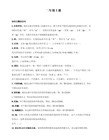
+不定式”结构作宾语。这类动词主要有:know, suggest,
他会弹钢琴。
我们一直未发现如何打开这个盒子。
你可以给我解释一下怎么做蛋糕吗?
有些动词,如tell, ask, show, advise, teach, inform等,还可以先加上一个间接宾语,之后再加上“疑
特殊疑问词+不定式”的用法
+不定式”结构(question word + to-infinitive)
)疑问代词who, what, which等和疑问副词when, where, how等后面跟不定式,以及连接副词
与不定式连用构成不定式短语(在作用上相当于一个名词性从句,名词成分)。这种结构在
疑问词 + 不定式)。这类动词常用的有advise, ask, show, teach, tell, inform等,先加上一个间
+不定式”结构作直接宾语。
他会建议你们做什么
你能示范教我如何使用这部机器吗?
should / ought to 或者 should not / ought not to
)作宾语(作用相当于名词性从句)
用作动词宾语
他询问如何打开盒子。
她想不出说什么。
老师向我们说明如何使用文字处理机。
我知道到哪里能找到这个男孩。(作动词know的宾语)
作于间接宾语后作直接宾语
我将给你讲这怎么做。
她好心的劝告我该做什么。
我姐姐教我如何折纸鹤。
to的动词不定式(即动词原形),构成Why do sth.?/Why not do sth? 结构。肯定形式
“特殊疑问词+动词不定式”的用法归纳

“ 【2 】特别疑问词+动词不定式”的用法归纳一.由两部分组成:疑问词和动词不定式(wh-+to do).疑问词部分包括疑问代词who, whom, what, which和whose以及疑问副词when, where和how.此外,衔接词“whether”也实用.它重要具有以下几种功效:⑴当主语,如:● When to hold the meeting has not yet been decided.● Where to live is a problem.⑵当宾语,常接在forget, find out, discuss, decide, tell, teach, know, learn, wonder, remember等动词之后作宾语如:● We must know what to say at a meeting.● He could not tell whom to trust.● Do you know how to play bridge?⑶当表语,如:● The problem is where to find the financial aid.● The question is who to elect.⑷当名词同位语,如:● Tom had no idea which book to read first.● The question whether to confess troubled the girl.⑸用于宾语补足语,双重宾语.某些动词后可接“sb.+ 疑问词 + 不定式”组成的双重宾语,这类动词常用的有advise, ask, show, teach, tell等如:● I can tell you where to get this book.●I ask her how to learn English.●H e will advise you what to do.●W ill you show me how to use the machine?(6) 作介词宾语:某些介词后面可接"疑问词+不定式"作宾语,这类介词常用的有 about, as, from, in, of, on, with 等.例如:He has no idea of how to answer this question. 他不知道如何答复这个问题.Della had only $1.87 with which to buy Jim a present. 德拉仅有$1.87为来吉姆买一件礼品.(which是关系代词)You have a number of topics from which to choose. 你有许多标题可以选择.(which是关系代词)二“特别疑问词+动词不定式”这种构造可以把复合句转为简略句.如:I don’t know what I’ll do next. = I don’t know what to do next.The doctor told him when he should take the medicine. = The doctor told him when to take the medicine.同样,因为“特别疑问词+动词不定式”这种构造相当于一个名词性从句,所以可用一致成分的从句代替,从而把简略句转换为复合句.改写时只需在疑问词后加上恰当的主语,并把不定式改为恰当的情势的谓语即可.如:Which to choose is important. = Which we should choose is important.The question is where to go. = The question is where we should go.三.“特别疑问词+动词不定式”这种构造可组成自力问句.如:What to do? 怎么办? How to get rid of the trouble? 若何摆脱困境?按照英语语法的习惯,疑问副词why 后不直接跟动词不定式,如:误:I don’t know why to choose that dictionary.正:I don’t know why you must choose that dictionary.但它可以接不带to的动词不定式,即动词本相,组成why do sth./ why not do sth. 确定情势是表示某动作是不必要的或没有意义的,而否认情势是表示向或人提建议和表达意见,相当于祈使句. Today is Sunday. Why not go out to relax yourself?Why pay more at other shops? We have the best value.演习:1.I have no idea when ___ her the bad news.A.will tellB.tellingC.tellD.to tell2. —Will you please show me how to do the role-playexercise?—Sure. Now let me tell you ____ first.A. which to doB. how to doC. when to doD. what to do3. I need your help because I don’t know ____.A. how to do itB. how to doC. what to do itD. what should I do4.—How are you feeling here?—It’s quite hot. I don’t kno w ____ to go or stay.A. howB. whenC. whetherD. where5.—I don’t know ____ to do with this maths problem.It’s too hard.— You can ask your classmates or teachers for help.A. whichB. howC. whatD. when6. — Millie, could you give me some advice? I d on’tknow ____.—Why don’t you wear this red shirt?A. when to wearB. what to wearC. how to wearD. where to wear7. I’m going on a field trip but I haven’t decided__________.A. what to doB. to do whatC. where to goD. to go where8 —This physics problem is too difficult. Can you show me ________, Wang Lin?—Sure.A. what to work it outB. what to work out itC. how to work it outD. how to work out it9. Excuse me. Would you please tell me ________ buy a digital camera?A. what toB. where toC. what I canD. where can I10. There isn't any difference between the two. I really don't know ________.A. where to chooseB. which to chooseC. to choose whatD. to choose which 用“疑问词+不定式”改写下列句子.1.How we should do it was discussed last night.__________ was discussed last night.2. I didn’t know where I should go.I didn’t know ____________.3. The difficulty was how we should cross the river.The difficulty was ____________ .依据汉语补全下列英语译文.1. 何时出发还不知道. ____________ is unknown.2. 我忘了该怎么办. I forgot___________.3. 我可以告知你哪里可以买到此书. I can tell you_________.4. Yao Ming 未决议下一步做什么.Yao Ming hasn’t decide ____________ next.5.She has decided ____________. (到哪儿工作.)6.Bill Gates knew ____________ (如何关心) children.7.I can’t decide ____________ (是否踢足球) or do homework.8. Paul knows ____________ (跟谁谈) for help.9.You should decide ____________ (做哪个) first.10.Simon just forgot ____________ (什么时光接) his friend.仁爱版英语九年级上册Unit3 Topic3测试题第二部分基本常识应用 (55分)Ⅰ.单项选择.(10分)( )1.—This physics problem is too difficult. Can you show me _____, Wang Li? —Sure.A.what to work it outB.what to work out itC.how to work it outD.how to work out it( )2.It is important _____ the piano well.A.of him to playB.for him to playC.of him playingD.for him to playing( )3.—Sorry, I can’t follow you. I beg your pardon?—_____A.You are welcomeB.That’s all right.C.Not at all.D.No problem.( )4.The old farmer felt like _____ a big house very much.A.to getB.getC.gettingD.got( )5.She _____ walk at night. How brave she is!A.dare toB.dares toC.dare notD.doesn’t dare to( )6.I will go to my doctor for _____ on healthy diet (饮食).A.an adviceB.some advicesC.any adviceD.some pieces of advice ( )7.It’s m y honor _____ to give a talk here.A.to inviteB.to be invitedC.invitingD.invite( )8.I usually go to the movies with my parents, but _____ alone.A.some timesB.sometimeC.at timesD.at time( )9.If you want to learn English well,i t’s useful to _____ befo re class and _____ after class.A.review; previewB.preview; reviewC.review; to previewD.preview; to review( )10.Listening, speaking and reading are all important _____ writing.A.besideB.besidesC.exceptD.expect第三部分写作 (25分)Ⅰ.词汇.(10分)(A)依据句意及首字母提醒补全单词.1.I am very w_____ in English, so I’m going to work hard at it.2.The plans have been under d_____.3.My English teacher told us many good m_____ to study.4.I’m sorry, I can’t follow you. Can you r_____ that?5.What a nice story! Can you r_____ it in English?(B)依据句意及汉语提醒完成句子.6.They ________ ________ ________(保持弹奏) the music late yesterday night.7.Please ________ ________ ________ ________(深呼吸) and relax yourself before you give aspeech in class.8.We can learn from ________ ________(犯错误).9.He is so excited that he can’t say ________ ________(完全的话).10.In order to ________ ________ (演习语法), I keep a diary.Ⅱ.句型转换.(5分)11.Every year the farmers plant many trees on those hills.(改为被动语态)Many trees _______ _______ on those hills _______ the farmers every year.12.I don’t know what I should do with the broken bike.(同义句转换)I don’t know what _______ _______ _______ the broken bike.13.Don’t give up learning English, it’s helpful to you.(同义句转换)Don’t _______ _______ English, it’s helpful to you.14.The children had a good time in Disneyland.(同义句转换)The children _______ _______ in Disneyland. 15.Jane would like to eat some fish.(同义句转换) Jane _______ _______ _______ some fish.。
(完整版)特殊疑问词+动词不定式结构
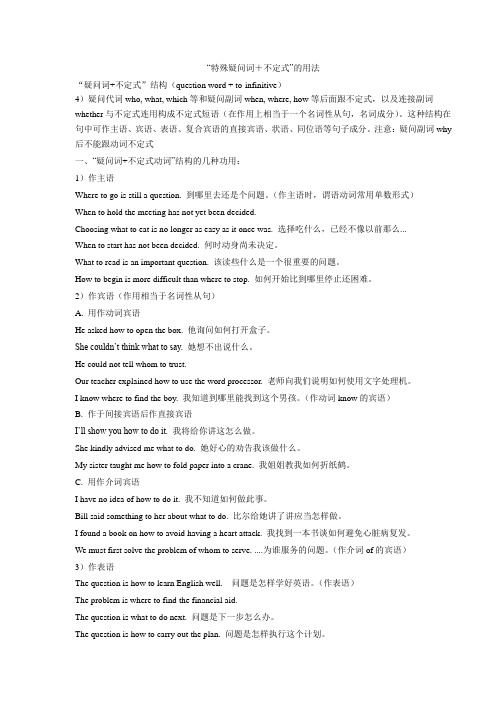
“特殊疑问词+不定式”的用法“疑问词+不定式”结构(question word + to-infinitive)4)疑问代词who, what, which等和疑问副词when, where, how等后面跟不定式,以及连接副词whether与不定式连用构成不定式短语(在作用上相当于一个名词性从句,名词成分)。
这种结构在句中可作主语、宾语、表语、复合宾语的直接宾语、状语、同位语等句子成分。
注意:疑问副词why 后不能跟动词不定式一、“疑问词+不定式动词”结构的几种功用:1)作主语Where to go is still a question. 到哪里去还是个问题。
(作主语时,谓语动词常用单数形式)When to hold the meeting has not yet been decided.Choosing what to eat is no longer as easy as it once was. 选择吃什么,已经不像以前那么...When to start has not been decided. 何时动身尚未决定。
What to read is an important question. 该读些什么是一个很重要的问题。
How to begin is more difficult than where to stop. 如何开始比到哪里停止还困难。
2)作宾语(作用相当于名词性从句)A. 用作动词宾语He asked how to open the box. 他询问如何打开盒子。
She couldn’t think what to say. 她想不出说什么。
He could not tell whom to trust.Our teacher explained how to use the word processor. 老师向我们说明如何使用文字处理机。
I know where to find the boy. 我知道到哪里能找到这个男孩。
“特殊疑问词动词不定式”的用法归纳

“特殊疑问词+动词不定式”的用法归纳一.由两部分构成:疑问词和动词不定式(wh-+to do)。
疑问词部分包括疑问代词who, whom, what, which和whose以及疑问副词when,where和how。
此外,连接词“whether”也适用.它主要具有以下几种功能:⑴当主语,如:● When to hold the meeting has not yet been decided.● Where to live is a problem.⑵当宾语,常接在forget,findout,discuss,decide,tell,teach,know,learn,wonder, rember等动词之后作宾语如:● We must know what to say at a meeting.● He could not tell whom to trust.● Do you know how to play bridge?⑶当表语,如:● The problem is where to find thefinancial aid.● The question is who to elect.⑷当名词同位语,如:● Tom had no idea which book to read first.●The question whether to confess troubled the girl.⑸用于宾语补足语,双重宾语。
某些动词后可接“sb.+疑问词+不定式”构成的双重宾语,这类动词常用的有advise, ask, show, teach, tell等如:● I cantell you where to get this book.●I ask her how to learn English.●He will advise you what to do.●Will you show me how to use the machine?(6)作介词宾语:某些介词后面可接"疑问词+不定式"作宾语,这类介词常用的有about, as, from, in, of, on,with等。
特殊疑问词+动词不定式结构以及句法功能

“特殊疑问词+动词不定式”的用法“疑问词+不定式”结构中。
疑问代词who,what,which,whose和疑问副词when,where,how等后面跟不定式,以及连接副词whether与不定式连用构成不定式短语(这个不定时短语相当于一个名词)。
这种结构在句中可作主语、宾语、表语、宾语的补语,状语,同位语等句子成分。
注意:疑问副词why后不能跟动词不定式一:作主语(作主语,作主语时,谓语动词常用单数形式)1.Wheretogoisstillaquestion.到哪里去还是个问题。
2.Whattodoisnotdecidedyet3.Howtobeginismoredifficultthanwheretostop4.Whentoholdthemeetinghasnotyetbeendecided.二:作宾语,类似的动词有:decide,ask,cons1.Iknowwheretofindtheboy.我知道到哪里能找到这个男孩。
2.Wemustfirstsolvetheproblemofwhomtoserve.我们必须首先解决为谁服务的问题。
(作介词of3.Wemustknowhowtooperatethemachine.on的宾语)11.Doyouknowhowtoplaybridge?12,I’llshowyouhowtodoit.我要让你看看如何做这件事。
,13,You’dbetterfindoutwheretoputit.你最好弄清楚要把它放在哪里。
14.Icouldnotdecidewhichdictonarytobuy.15.Jackdidnotknowwheretofindsuchagoodteacher.16.Theyoungwomandoesn’tknowwhattodo.那位年轻女子不知道怎么办。
17.Hehasnoideaofhowtoanswerthisquestion.他不知道怎样回答这个问题。
特殊疑问词+动词不定式结构
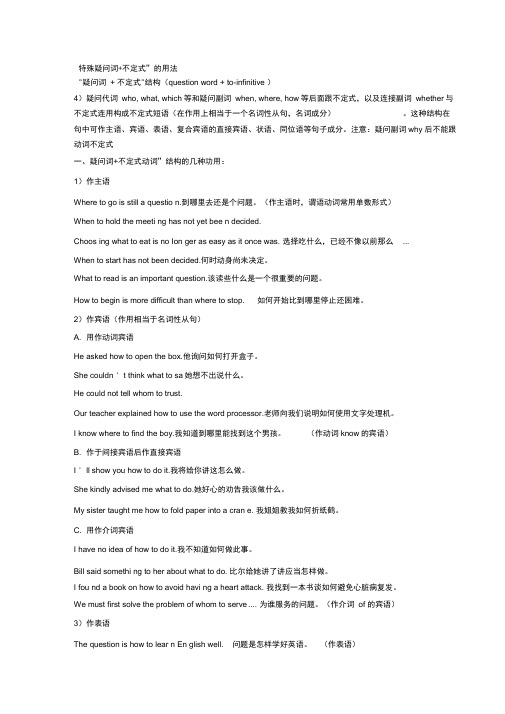
特殊疑问词+不定式”的用法"疑问词+ 不定式"结构(question word + to-infinitive )4)疑问代词who, what, which等和疑问副词when, where, how等后面跟不定式,以及连接副词whether与不定式连用构成不定式短语(在作用上相当于一个名词性从句,名词成分)。
这种结构在句中可作主语、宾语、表语、复合宾语的直接宾语、状语、同位语等句子成分。
注意:疑问副词why 后不能跟动词不定式一、疑问词+不定式动词”结构的几种功用:1)作主语Where to go is still a questio n.到哪里去还是个问题。
(作主语时,谓语动词常用单数形式)When to hold the meeti ng has not yet bee n decided.Choos ing what to eat is no Ion ger as easy as it once was. 选择吃什么,已经不像以前那么...When to start has not been decided.何时动身尚未决定。
What to read is an important question.该读些什么是一个很重要的问题。
How to begin is more difficult than where to stop. 如何开始比到哪里停止还困难。
2)作宾语(作用相当于名词性从句)A. 用作动词宾语He asked how to open the box.他询问如何打开盒子。
She couldn ' t think what to sa她想不出说什么。
He could not tell whom to trust.Our teacher explained how to use the word processor.老师向我们说明如何使用文字处理机。
“特殊疑问词+动词不定式”的用法归纳
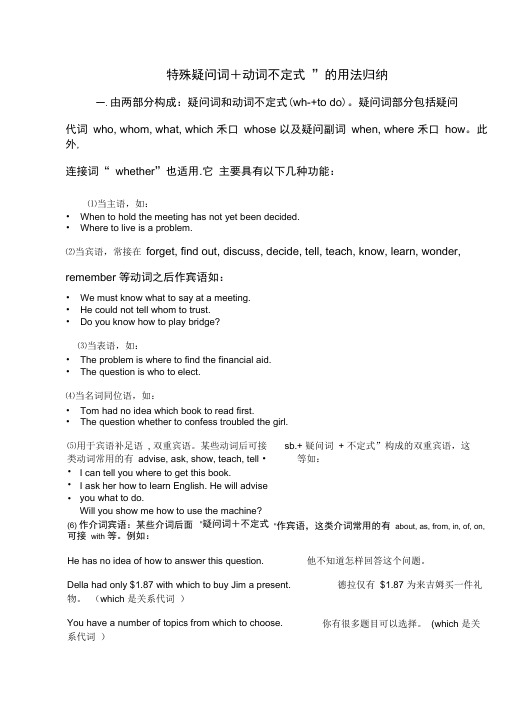
特殊疑问词+动词不定式”的用法归纳一.由两部分构成:疑问词和动词不定式(wh-+to do)。
疑问词部分包括疑问代词who, whom, what, which 禾口whose 以及疑问副词when, where 禾口how。
此外,连接词“ whether”也适用.它主要具有以下几种功能:⑴当主语,如:•When to hold the meeting has not yet been decided.•Where to live is a problem.⑵当宾语,常接在forget, find out, discuss, decide, tell, teach, know, learn, wonder, remember 等动词之后作宾语如:•We must know what to say at a meeting.•He could not tell whom to trust.•Do you know how to play bridge?⑶当表语,如:•The problem is where to find the financial aid.•The question is who to elect.⑷当名词同位语,如:•Tom had no idea which book to read first.•The question whether to confess troubled the girl.⑸用于宾语补足语, 双重宾语。
某些动词后可接类动词常用的有advise, ask, show, teach, tell ••••sb.+ 疑问词+ 不定式”构成的双重宾语,这等如:I can tell you where to get this book.I ask her how to learn English. He will adviseyou what to do.Will you show me how to use the machine?"疑问词+不定式(6) 作介词宾语:某些介词后面可接with 等。
“特殊疑问词+动词不定式”的用法归纳
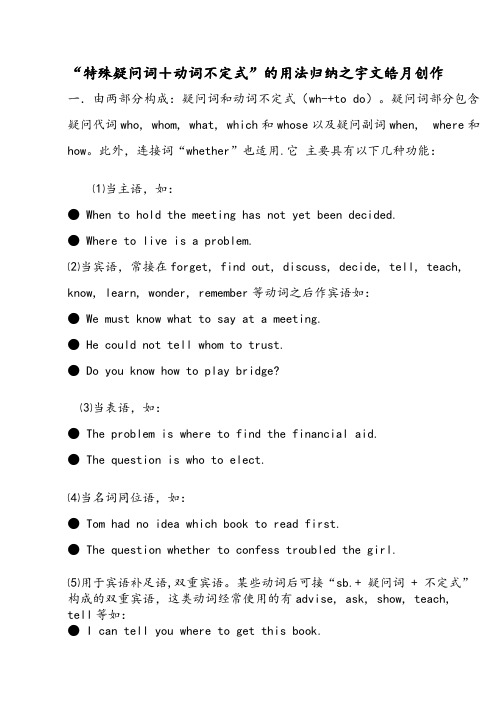
“特殊疑问词+动词不定式”的用法归纳之宇文皓月创作一.由两部分构成:疑问词和动词不定式(wh-+to do)。
疑问词部分包含疑问代词who, whom, what, which和whose以及疑问副词when, where和how。
此外,连接词“whether”也适用.它主要具有以下几种功能:⑴当主语,如:● When to hold the meeting has not yet been decided.● Where to live is a problem.⑵当宾语,常接在forget, find out, discuss, decide, tell, teach, know, learn, wonder, remember等动词之后作宾语如:● We must know what to say at a meeting.● He could not tell whom to trust.● Do you know how to play bridge?⑶当表语,如:● The problem is where to find the financial aid.● The question is who to elect.⑷当名词同位语,如:● Tom had no idea which book to read first.● The question whether to confess troubled the girl.⑸用于宾语补足语,双重宾语。
某些动词后可接“sb.+ 疑问词 + 不定式”构成的双重宾语,这类动词经常使用的有advise, ask, show, teach,tell等如:● I can tell you where to get this book.●I ask her how to learn English.●H e will advise you what to do.●W ill you show me how to use the machine?(6) 作介词宾语:某些介词后面可接"疑问词+不定式"作宾语,这类介词经常使用的有 about, as, from, in, of, on, with等。
“特殊疑问词 动词不定式”的用法归纳
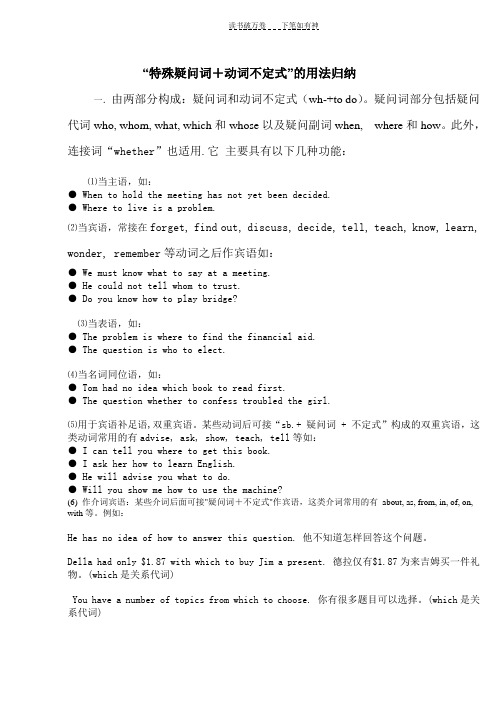
“特殊疑问词+动词不定式”的用法归纳一.由两部分构成:疑问词和动词不定式(wh-+to do)。
疑问词部分包括疑问代词who, whom, what, which和whose以及疑问副词when, where和how。
此外,连接词“whether”也适用.它主要具有以下几种功能:⑴当主语,如:● When to hold the meeting has not yet been decided.● Where to live is a problem.⑵当宾语,常接在forget, find out, discuss, decide, tell, teach, know, learn, wonder, remember等动词之后作宾语如:● We must know what to say at a meeting.● He could not tell whom to trust.● Do you know how to play bridge?⑶当表语,如:● The problem is where to find the financial aid.● The question is who to elect.⑷当名词同位语,如:● Tom had no idea which book to read first.● The question whether to confess troubled the girl.⑸用于宾语补足语,双重宾语。
某些动词后可接“sb.+ 疑问词 + 不定式”构成的双重宾语,这类动词常用的有advise, ask, show, teach, tell等如:● I can tell you where to get this book.● I ask her how to learn English.● He will advise you what to do.● Will you show me how to use the machine?(6) 作介词宾语:某些介词后面可接"疑问词+不定式"作宾语,这类介词常用的有about, as, from, in, of, on, with等。
特殊疑问词动词不定式结构

“疑问词 +不定式”构造( question word + to-infinitive)4)疑问代词 who, what, which等和疑问副词 when, where, how 等后边跟不定式,以及连结副词whether 与不定式连用组成不定式短语(在作用上相当于一个名词性从句,名词成分)。
这种构造在句中可作主语、宾语、表语、复合宾语的直接宾语、状语、同位语等句子成分。
注意:疑问副词why 后不可以跟动词不定式一、“疑问词 +不定式动词”构造的几种功用:1)作主语Where to go is still a question.到哪里去仍是个问题。
(作主语时,谓语动词常用单数形式)When to hold the meeting has not yet been decided.Choosing what to eat is no longer as easy as it once was. 选择吃什么,已经不像从前那么 ... When to start has not been decided.何时起程还没有决定。
What to read is an important question.该读些什么是一个很重要的问题。
How to begin is more difficult than where to stop.如何开始比到哪里停止还困难。
2)作宾语(作用相当于名词性从句)A. 用作动词宾语He asked how to open the box.他咨询如何翻开盒子。
She couldn ’t think what to say.她想不出说什么。
He could not tell whom to trust.Our teacher explained how to use the word processor.老师向我们说明如何使用文字办理机。
I know where to find the boy.我知道到哪里能找到这个男孩。
“特殊疑问词+动词不定式”的用法归纳

“特殊疑问词+动词不定式”的用法归纳之迟辟智美创作一.由两部份构成:疑问词和动词不定式(wh-+to do).疑问词部份包括疑问代词who, whom, what, which和whose以及疑问副词when, where和how.另外,连接词“whether”也适用.它主要具有以下几种功能:⑴当主语,如:● When to hold the meeting has not yet been decided.● Where to live is a problem.⑵当宾语,常接在forget, find out, discuss, decide, tell, teach, know, learn, wonder, remember等动词之后作宾语如:● We must know what to say at a meeting.● He could not tell whom to trust.● Do you know how to play bridge?⑶当表语,如:● The problem is where to find the financial aid.● The question is who to elect.⑷当名词同位语,如:● Tom had no idea which book to read first.● The question whether to confess troubled the girl.⑸用于宾语补足语,双重宾语.某些动词后可接“sb.+ 疑问词 + 不定式”构成的双重宾语,这类动词经常使用的有advise, ask, show, teach, tell等如:● I can tell you where to get this book.●I ask her how to learn English.●H e will advise you what to do.●W ill you show me how to use the machine?(6) 作介词宾语:某些介词后面可接"疑问词+不定式"作宾语,这类介词经常使用的有 about, as, from, in, of, on, with等.例如:He has no idea of how to answer this question. 他不知道怎样回答这个问题. Della had only $1.87 with which to buy Jim a present. 德拉仅有$1.87为来吉姆买一件礼物.(which是关系代词)You have a number of topics from which to choose. 你有很多题目可以选择.(which是关系代词)二“特殊疑问词+动词不定式”这种结构可以把复合句转为简单句.如:I don’t know what I’ll do next. = I don’t know what to do next.The doctor told him when he should take the medicine. = The doctor told him when to take the medicine.同样,因为“特殊疑问词+动词不定式”这种结构相当于一个名词性从句,所以可用同等成份的从句取代,从而把简单句转换为复合句.改写时只需在疑问词后加上适当的主语,并把不定式改为适当的形式的谓语即可.如:Which to choose is important. = Which we should choose is important.The question is where to go. = The question is where we should go.三、“特殊疑问词+动词不定式”这种结构可构成自力问句.如:What to do? 怎么办? How to get rid of the trouble? 如何解脱困境?依照英语语法的习惯,疑问副词why 后不直接跟动词不定式,如:误:I don’t know why to choose that dictionary.正:I don’t know why you must choose that dictionary.但它可以接不带to的动词不定式,即动词原形,构成why do sth./ why not do sth. 肯定形式是暗示某举措是不需要的或没有意义的,而否定形式是暗示向某人提建议和表达看法,相当于祈使句.Today is Sunday. Why not go out to relax yourself?Why pay more at other shops? We have the best value.练习:1.I have no idea when ___ her the bad news.A.will tellB.tellingC.tellD.to tell2. —Will you please show me how to do the role-playexercise?—Sure. Now let me tell you ____ first.A. which to doB. how to doC. when to doD. what to do3. I need your help because I don’t know ____.A. how to do itB. how to doC. what to do itD. what should I do4.—How are you feeling here?—It’s quite hot. I don’t know ____ to go or sta y.A. howB. whenC. whetherD. where5.—I don’t know ____ to do with this maths problem.It’s too hard.— You can ask your classmates or teachers for help.A. whichB. howC. whatD. when6. —Millie, could you give me some advice? I don’tknow ____.— Wh y don’t you wear this red shirt?A. when to wearB. what to wearC. how to wearD. where to wear7. I’m going on a field trip but I haven’t decided__________.A. what to doB. to do whatC. where to goD. to go where8 —This physics problem is too difficult. Can you show me ________,Wang Lin?—Sure.A. what to work it outB. what to work out itC. how to work it outD. how to work out it9. Excuse me. Would you please tell me ________ buy a digital camera?A. what toB. where toC. what I canD. where can I10. There isn't any difference between the two. I really don't know________.A. where to chooseB. which to chooseC. to choose whatD. to choose which用“疑问词+不定式”改写下列句子.1.How we should do it was discussed last night.__________ was discussed last night.2. I didn’t know where I should go.I didn’t know ____________.3. The difficulty was how we should cross the river.The difficulty was ____________ .根据汉语补全下列英语译文.1. 何时出发还不知道. ____________ is unknown.2. 我忘了该怎么办. I forgot___________.3. 我可以告诉你哪里可以买到此书. I can tell you_________.4. Yao Ming 未决定下一步做什么.Yao Ming hasn’t decide ____________ next.5.She has decided ____________. (到哪儿工作.)6.Bill Gates knew ____________ (怎样帮手) children.7.I can’t decide ____________ (是否踢足球) or do homework.8. Paul knows ____________ (跟谁谈) for help.9.You should decide ____________ (做哪个) first.10.Simon just forgot ____________ (什么时间接) his friend.仁爱版英语九年级上册Unit3 Topic3测试题第二部份基础知识运用 (55分)Ⅰ.单项选择.(10分)( )1.—This physics problem is too difficult. Can you show me _____, Wang Li?—Sure.A.what to work it outB.what to work out itC.how to work it outD.how to work out it( )2.It is important _____ the piano well.A.of him to playB.for him to playC.of him playingD.for him to playing( )3.—Sorry, I can’t follow you. I beg your pardon?—_____A.You are welcomeB.That’s all right.C.Not at all.D.No problem.( )4.The old farmer felt like _____ a big house very much.( )5.She _____ walk at night. How brave she is!A.dare toB.dare s toC.dare notD.doesn’t dare to( )6.I will go to my doctor for _____ on healthy diet (饮食).A.an adviceB.some advicesC.any adviceD.some pieces of advice( )7.It’s my honor _____ to give a talk here.( )8.I usually go to the movies with my parents, but _____ alone.A.some timesB.sometimeC.at timesD.at time( )9.If you want to learn English well,i t’s useful to _____ before class and _____ after class.A.review; previewB.preview; reviewC.review; to previewD.preview; to review( )10.Listening, speaking and reading are all important _____ writing.第三部份写作 (25分)Ⅰ.辞汇.(10分)(A)根据句意及首字母提示补全单词.1.I am very w_____ in English, so I’m going to work hard at it.2.The plans have been under d_____.3.My English teacher told us many good m_____ to study.4.I’m sorry, I can’t follow you. Can you r_____ that?5.What a nice story! Can you r_____ it in English?(B)根据句意及汉语提示完成句子.6.They ________ ________ ________(坚持弹奏) the music lateyesterday night.7.Please ________ ________ ________ ________(深呼吸) and relaxyourself before you give a speech in class.8.We can learn from ________ ________(犯毛病).9.He is so excited that he can’t say ________ ________(完整的话).10.In order to ________ ________ (练习语法), I keep a diary.Ⅱ.句型转换.(5分)11.Every year the farmers plant many trees on those hills.(改为主动语态)Many trees _______ _______ on those hills _______ the farmers every year.12.I don’t know what I should do with the broken bike.(同义句转换)I don’t know what _______ _______ _______ the broken bike.’t give up learning English, it’s helpful to you.(同义句转换)Don’t _______ _______ English, it’s helpful to you.14.The children had a good time in Disneyland.(同义句转换)The children _______ _______ in Disneyland.15.Jane would like to eat some fish.(同义句转换)Jane _______ _______ _______ some fish.。
- 1、下载文档前请自行甄别文档内容的完整性,平台不提供额外的编辑、内容补充、找答案等附加服务。
- 2、"仅部分预览"的文档,不可在线预览部分如存在完整性等问题,可反馈申请退款(可完整预览的文档不适用该条件!)。
- 3、如文档侵犯您的权益,请联系客服反馈,我们会尽快为您处理(人工客服工作时间:9:00-18:30)。
“特殊疑问词+动词不定式”的用法一、“疑问词+不定式”结构中。
疑问代词who, what, which等和疑问副词when, where, how等后面跟不定式,以及连接副词whether与不定式连用构成不定式短语(这个不定时短语相当于一个名词)。
这种结构在句中可作主语、宾语、表语、宾语的补语,状语,同位语等句子成分。
注意:疑问副词why后不能跟动词不定式作主语Where to go is still a question. 到哪里去还是个问题。
(作主语,作主语时,谓语动词常用单数形式)Choosing what to eat is no longer as easy as it once was.选择吃什么,已经不像以前那么简单了。
作宾语I know where to find the boy. 我知道到哪里能找到这个男孩。
(作动词know的宾语)We must first solve the problem of whom to serve. 我们必须首先解决为谁服务的问题。
(作介词of的宾语)作表语The question is how to learn English well.问题是怎样学好英语。
(作表语)作宾语补语I asked her how to learn English.我问她如何学英语。
(用双宾语,宾语补足语)做状语She was at a loss what to do.她不知如何是好。
(做状语)做同位语The question whether to confess troubled the girl.是否要坦白的问题使姑娘很烦恼。
(做同位语)I have no idea which one to take.我不知道拿哪个好。
(同位语)二、“特殊疑问词+动词不定式”结构经常用在某些动词后作宾语,类似的动词有:tell, show, know, learn, teach, find out, forget, wonder, remember等。
如:1,I’ll show you how to do it.我要让你看看如何做这件事。
,2,You’d better find out where to put it.你最好弄清楚要把它放在哪里。
作双重宾语(宾语补足语):某些动词后面可接"sb.+疑问词+不定式"构成的双重宾语,这类动词常用的有advise, ask, show, teach, tell等。
例如:He will advise you what to do.他会建议你们做什么Will you show me how to use this machine?你能示范教我如何使用这部机器吗?作介词宾语:某些介词后面可接"疑问词+不定式"作宾语,这类介词常用的有about, as, from, in, of, on, with等。
例如:You also need to learn the basic skills of rafting, such as how to handle the raft, how to paddle and how to get in and out of the raft. 你还需要学习基本划木筏的技巧,比如驾驭木筏的方法,划桨方法,上下木筏的方法。
He has no idea of how to answer this question.他不知道怎样回答这个问题。
Della had only $1.87 with which to buy Jim a present.德拉仅有$1.87为来吉姆买一件礼物。
(which是关系代词)You have a number of topics from which to choose.你有很多题目可以选择。
(which是关系代词)When you are trying to advise someone about what to do or what not to do, you can use should / ought to or should not /ought not to.当你想要建议某人做什么或者不做什么时,你可以用should /ought to 或者should not / ought not to。
三、“特殊疑问词+动词不定式”这种结构可以把复合句转为简单句。
如:1,I don’t know what I’ll do next.= I don’t know what to do next.2,The doctor told him when he should take the medicine.= The doctor told him when to take the medicine.同样,因为“特殊疑问词+动词不定式”这种结构相当于一个名词性从句,所以可用同等成分的从句代替,从而把简单句转换为复合句。
改写时只需在疑问词后加上适当的主语,并把不定式改为适当的形式的谓语即可。
如:1,Li Ping doesn’t know why to learn English.= Li Ping doesn’t know why he should learn English.2,Which to choose is important.= Which we should choose is important.3,The question is where to go.= The question is where we should go.四、“特殊疑问词+动词不定式”这种结构可构成独立问句。
如:What to do? 怎么办?How to get rid of the trouble? 如何摆脱困境?然而,这个结构看似简单,但也容易出错,有几点是需要我们注意的:易错一:按照英语语法的习惯,疑问副词why后不直接跟动词不定式。
如:误:I don't know why to choose that dictionary. (X)正:I don’t know why you must choose that dictionary.但它可以接不带to的动词不定式(即动词原形),构成Why do sth.?/Why not do sth? 结构。
肯定形式表示某动作是不必要的或没有意义的,而否定形式则用于向某人提建议和表达看法,相当于祈使句。
Today is Sunday. Why not go out to relax yourself?今天是周日,干嘛不出去轻松一下呢?Why pay more at other shops? We have the best value.为什么花更多的钱到其他商店去买?我们这里物美价廉。
另外,还需要注意的是:why not这个结构的否定式通常只用于谈论现在和将来,而不用于谈论过去。
如:误:Why not clean the room yesterday? (X)正:Why didn’t you clean the room yesterday?易错二:有些动词可以直接跟不定式作宾语,但有些动词是不能直接跟不定式作宾语的,这些不能直接跟不定式的动词它们的后面可以接“疑问词+不定式”结构作宾语。
这类动词主要有:know, suggest, consider, discover, discuss, explain, understand, wonder等。
如:He knows how to play the piano.他会弹钢琴。
We never discovered how to open the box.我们一直未发现如何打开这个盒子。
Can you explain how to make a cake?你可以给我解释一下怎么做蛋糕吗?有些动词,如tell, ask, show, advise, teach, inform等,还可以先加上一个间接宾语,之后再加上“疑问词+不定式”结构作直接宾语。
如:Please tell us where to show our tickets.请告诉我们在哪里验票。
Have you told him where to get the application form?你告诉他到哪里去拿申请表了吗?易错三:“疑问词+不定式”结构,通常不用于动词think的现在式和过去式之后,但可以用于think的其他形式之后(如现在进行式),如:I’m thinking what to do next.我在想接下来要做什么。
I’m thinking how to use this computer.我在想如何使用这台电脑。
有时,此结构还可以用在有助动词的think之后,如:She couldn’t think what to give the children for Christmas.她想不出圣诞节送孩子们什么礼物。
易错四:在“which+不定式”结构中,which有时可以是疑问词,那就和我们所说的“疑问词+不定式”结构一样。
如:I can’t decide which to choose.我不能决定选哪一个好。
Did you ask her which to buy?你问没问她该买哪一个?但有时which可能是关系代词,那么这个结构就相当于一个定语从句了,此时主要用于介词之后作宾语。
如:She must have time in which to grow calm.她必须有冷静下来的时间。
=She must have time in which she can grow calm.Allow me one minute in which to change my costumes.给我一点时间来卸装。
=Allow me one minute in which I can change my costumes.结束。
